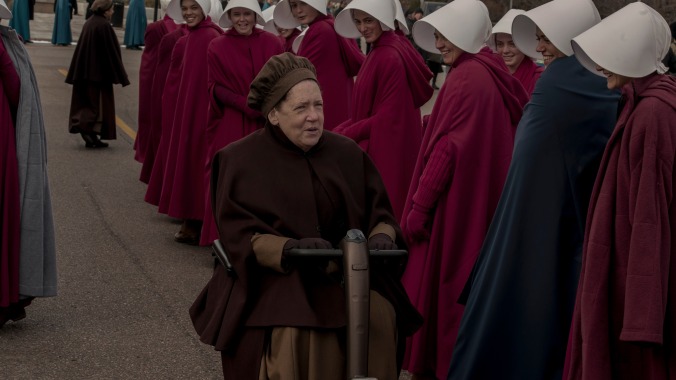Ann Dowd Photo: Elly Dassas
Janine, a woman driven to a place of sweetness and singular focus by extreme hardship and physical and psychological abuse, seems to vibrate in place. She’s guileless, all raw emotion and pure need, with so much love pouring forth that to look at her can be difficult. This is not a world built for such a person, even though it made her this way; she acts on pure, sweet impulse, and the world reacts with violent force. Again. So June steps up. Again. And Aunt Lydia seems totally flummoxed by the conflicting responses within her to this woman who just wants to love her baby. Again.
Repetition can be a very valuable thing in drama. We are apt to make the same mistakes over and over again, even when we know better, and the repetition of a moment like this can speak to such destructive cycles—but while our mistakes in life are often repeated unconsciously, a TV series had sure as shit better know when it’s revisiting the narrative scene of the crime. And in “God Bless The Child,” it’s not clear that The Handmaid’s Tale knows any such thing.
What’s frustrating about this—and it’s also a potential explanation for its taking place at all—is that for the most part, this is an effective hour. June continues to try her hand at pulling strings (in this case, pulling Waterfordian strings by encouraging both Fred and Serena to put the latter in a position to seize more power), but her dynamic with both feels oddly stuck in season two, despite the massive changes that have taken place. Yes, Moss is terrific, and so is Strahovski—even Joseph Fiennes, not this writer’s favorite member of the cast, does some good stuff here—but it’s all flat, somehow. June having her Peggy Olson smoking moment with Serena should feel monumental. Can you imagine her making an offer like that in any other episode this season? But it’s easy to imagine her making such an offer last season, and with that storyline at least, there’s the rub.
The same can be said, to a certain extent, of June’s dynamic with her new walking partner, Ofmatthew (unless I missed it somehow, we still don’t know that woman’s name; the actor’s name is Ashleigh LaThrop). As with Sydney Sweeney’s Eden last year, Ofmatthew’s piety makes her both dangerous and likely to stop almost any conversation dead in its tracks. This time, however, there’s some variation—whatever Ofmatthew’s deal is, she’s far from an innocent. While we still haven’t seen much of Ofmatthew, LaThrop’s a compelling presence, making this woman about who we know very little someone you wouldn’t want to cross and someone you absolutely want to cross, simultaneously.
It’s particularly interesting in the context of this episode, which sees June and, most unexpectedly, Naomi Putnam (the always welcome Ever Carradine) wrestle with religion in their ow private ways. We may not know what precisely pushes Naomi to extend this (admittedly very small) kindness to Janine, but it’s fair to guess that it’s linked to the fact that Janine saved Angela’s life last year, since Naomi also thanks June for her assistance on the bridge. And that’s all tied up with the notion of forgiveness and gratitude and blessings, notions Gilead likes to nod toward rather than actually reckon with. Regardless, Carradine is terrific, never more so than in that long, painful scene with Janine, which begins with fear of one kind and ends with fear, and perhaps disgust, of another.
It’s clear that Aunt Lydia’s brush with death has brought out her very worst qualities, and it’s not as though she was short on those in the first place. I expect there’s more of this story to come—why just hint at some inner storm when you have Ann Dowd, who can play anything?—but watching her reckon with her own anger, her place in this world, her relationship to the handmaids (Janine in particular) is a fascinating thing. We’ve seen her rage spike before, including last week, but never quite like this. So that’s a theme revisited in a new way—the same latitude and longitude, but a peak, not a plateau.
Emily is another story. What’s odd about Emily’s sincerely affecting storyline is that while it is just that, sincerely affecting, it’s also somewhat insubstantial. Play exactly this day out over an hour, and perhaps the fact that such big things happen in such small fashion becomes the story. In such a circumstance, the quiet build to storytime might break your heart. What is the waiting like? What’s it like for her to be in that home that’s no longer hers? What’s it like to have this woman remember what kind of tea you like, but also be so removed from you? What’s it like to see those drawings on the wall?
Every one of those moments lands, every one is still and quiet, and every one feels too short. Sometimes big, monumental things happen in small, static ways. That can be fascinating. But they can’t be told in a way that’s efficient. They have to linger, just as the characters do. It’s not repetition, but it’s a plateau all the same.
On the other hand, Amma Asante’s direction is gorgeous, the actors all excellent, and that cliffhanger, balancing the danger of Gilead knowing where Nicole and Luke are with June’s sheer joy at seeing them together, a very fine one. A mixed bag of an episode if ever there was one.
Stray observations
- I appreciate that June’s rebellions serve to represent her seizing some kind of agency for herself, but every time she does something like smoke in a place she could be easily seen, I just want to scream, “WHY THE HELL WOULD YOU DO SOMETHING SO STUPID.”
- Cherry Jones returns! She still doesn’t have enough to do!

 Keep scrolling for more great stories.
Keep scrolling for more great stories.
